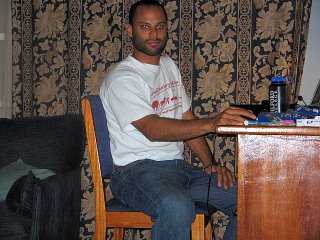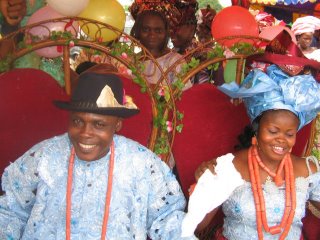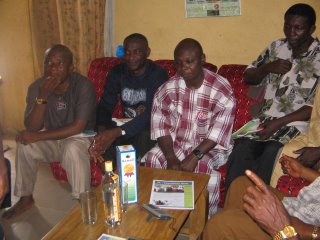Friday, September 29, 2006
Thursday, September 28, 2006
Saturday, September 23, 2006
Friday, September 22, 2006
Wednesday, September 13, 2006
My Arrival
 Captain’s Log 13 September 2006:
Captain’s Log 13 September 2006:Hi Friends! After three relatively uneventful days of travel, I have made it safely to Port Harcourt. The nostalgia of being back in West Africa did not hit me until arrived at the airport and was met by Mohammed, one of AAPW’s chauffeurs who had patiently waited for my arrival which was three hours late. He warmly greeted me as Mark and must have recognized me based on the description from my friend Dora who I am indebted to for helping create this opportunity. After leaving Germany my plane landed in Lagos where it refueled and continued to Abuja. I am happy to report that I did not depart the plane in Lagos to clear customs-which was an initial concern of mine. Unfortunately the urban layout of Lagos and Abuja (from my limited view) does not differ from the other African cities I have flown to-in that there are prevalent shanty towns, and make-shift houses surrounding the inner-city. In short the nostalgia was the result of the overwhelming friendliness and warmth expressed to me by the staff of AAPW who I have recently met. Additionally, I have four meals since arriving in country including SHRIMP confirming that West African food is by fare the best produced on the continent. Tomorrow I was invited to attend a meeting between AAPW and UNDP regarding a new project on disarmament demobilization and reintegration (DDR) and “mind-changing” (shifting attitudes via intervention). In addition to my research it looks like I will have the opportunity to do some other exciting work. My only disappointment thus fare is that Meaghan is not here with me. It just started raining!

Summary of Research - Based on Fulbright Application
My research will address the question of how and why particular ethnic groups feel threatened by other groups to the point where they feel violence is justified. Many local communities within the Niger Delta that have traditionally maintained their livelihood from the environment (fishing and farming) feel compromised because the federal and local governments have granted rights to both land and oil to foreign-owned companies. The tension between the Ijaw, Itsekiri, and Urhobo, who are indigenous to the Warri Region, is fueled by the perception that one group’s economic, cultural, and social gains are achieved at the expense of the others.
In the last ten years both the Warri and the greater Niger Delta Region of Nigeria have experienced well-documented inter-ethnic violence and hostilities. Although the region has made strides towards positive peace (e.g. addressing the structural issues of the conflict), conflict continues to impede the region’s economic and social development. The unrest in the Niger Delta has fostered an environment of deep distrust among the local communities, an unrest exacerbated by both the discovery of oil in the 1950’s and by economic deprivation.
The influx of economic development (and in some cases economic deprivation)
that the oil industry has brought to the local Warri population and to the greater delta region has contributed to an “aggressive manifest conflict process (AMCP): a situation in which at least two parties, or their representatives, attempt to pursue their perceptions of mutually incompatible goals by physically damaging or destroying one another’s property and high-value symbols (e.g., religious shrines, national monuments); and/or psychologically or physically injuring, destroying, or otherwise forcibly eliminating one another.” (Sandole, 1998, p. 1).
Economic deprivation and high levels of unemployment in the region continue to impact instability and conflict. Youth groups, via political arms of the various political organizations such as the Federated Niger Delta Ijaw Communities (FNDIC) led by Oboko Bello, the Itsekiri National Youth Council, led by Matthew Itsekure, and the Movement for the Emancipation of the Niger Delta (MEND), an Ijaw- dominated organization, have been disproportionately associated with much of the violence and instability affecting the Niger Delta. Regardless of what group is committing the majority of violent and hostile acts within the Niger Delta, the perception is that young men are carrying out the majority of armed attacks and kidnappings.
Limiting one’s analysis of the causes of instability in the delta region to economic deprivation alone is an over-simplification of the root causes of group violence; additionally, such a narrow explanation dismisses the Ijaw, Itsekiri, and Urhobo’s claimed pursuit of self-determination. The lack of revenue-generating activities, opportunities for education, perceived neglect from the federal government and international community, and grievances amongst ethnic groups all contribute to a hostile environment in the delta region, as well as increase violence along ethnic lines.
As inter-ethnic violence (at the group level) in the delta region continues, it is absolutely essential to understand how identity is altered to cause this violence. Specifically, my research will illustrate how the Ijaw, Itsekiri, and Urhobo groups alter the saliency of identity to engage in acts of violence based on their “collective axiology,” “a system of values that defines which actions are important for group members, which actions are prohibited, and which actions are necessary for specific situations.”(Korostelina, 2006, p. 5). In other words, by investigating how belligerent groups form and change their collective axiology, I will analyze how group identity is altered in a manner that causes, exacerbates, or directly contributes to ethnic violence as it relates to the Niger Delta.
In December of 2006, I will have successfully completed the field research component of my thesis, Saliency of Identity and Violence in the Niger Delta. After receiving my Master’s Degree in May 2007 from
If awarded a Fulbright Scholarship, I plan to return to
Works Cited
Korostelina, D. R. a. K. (2006). Chapter 1 Introduction: identity, morality, and threat (unpublished)

























